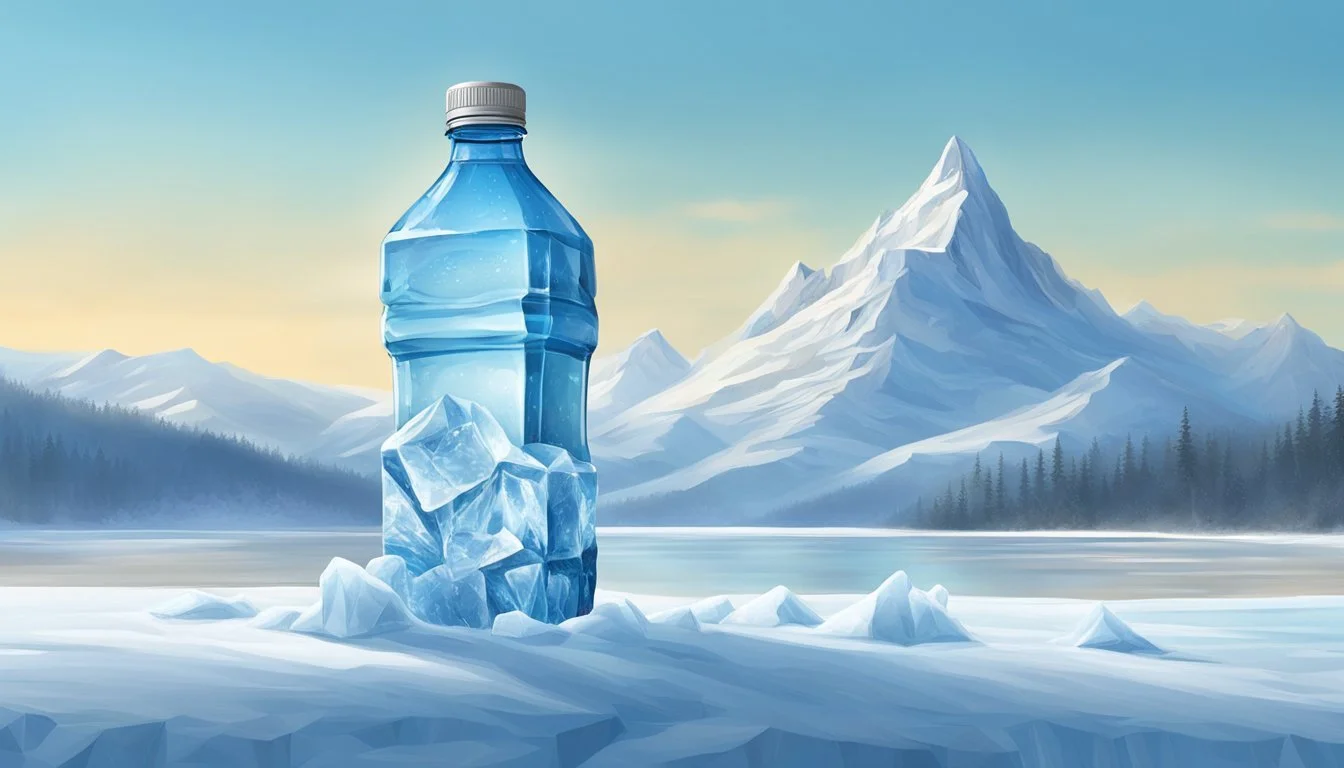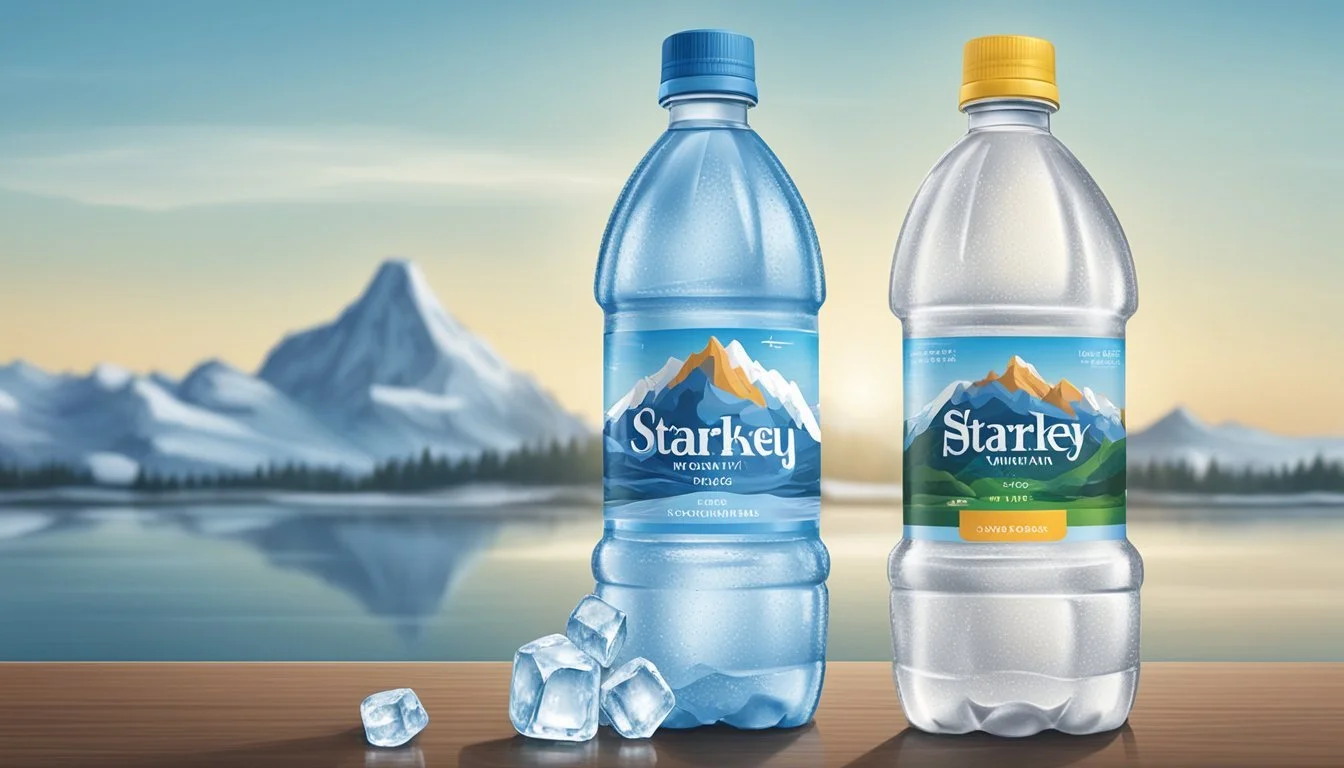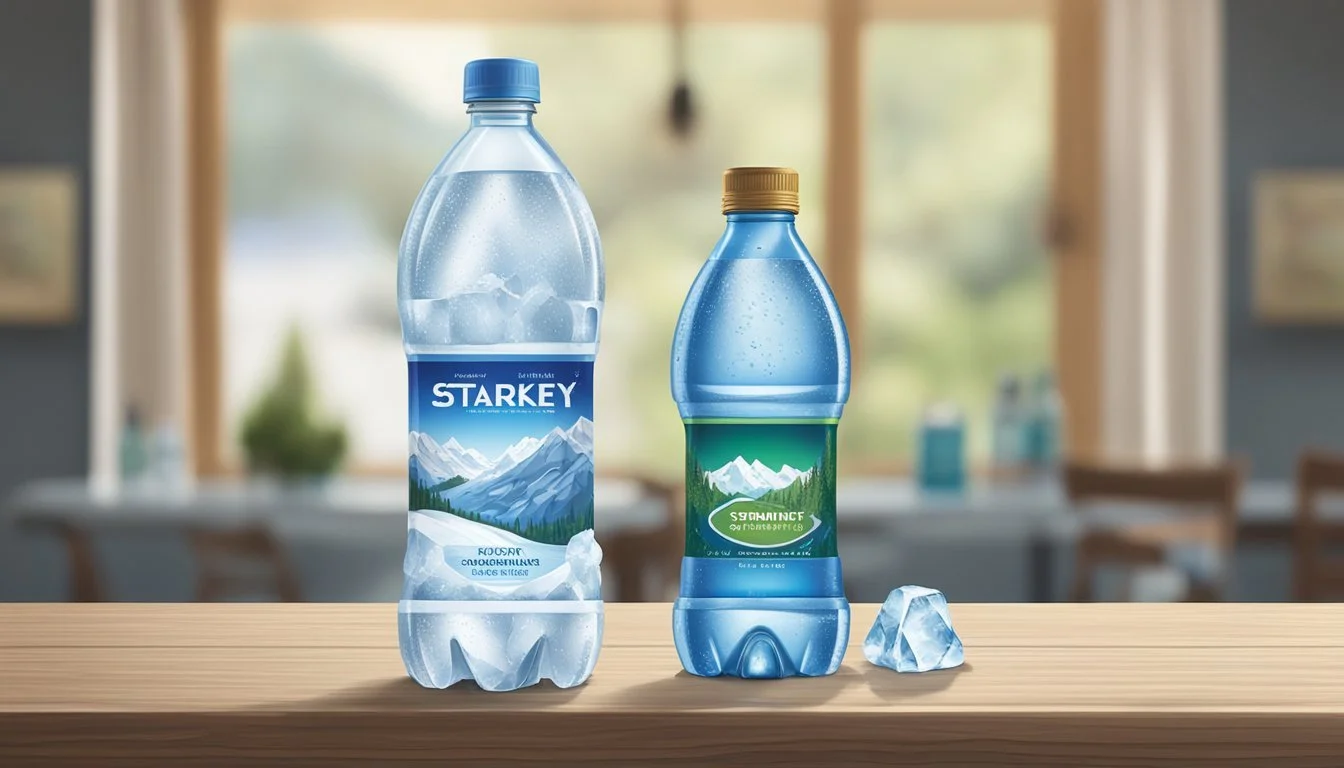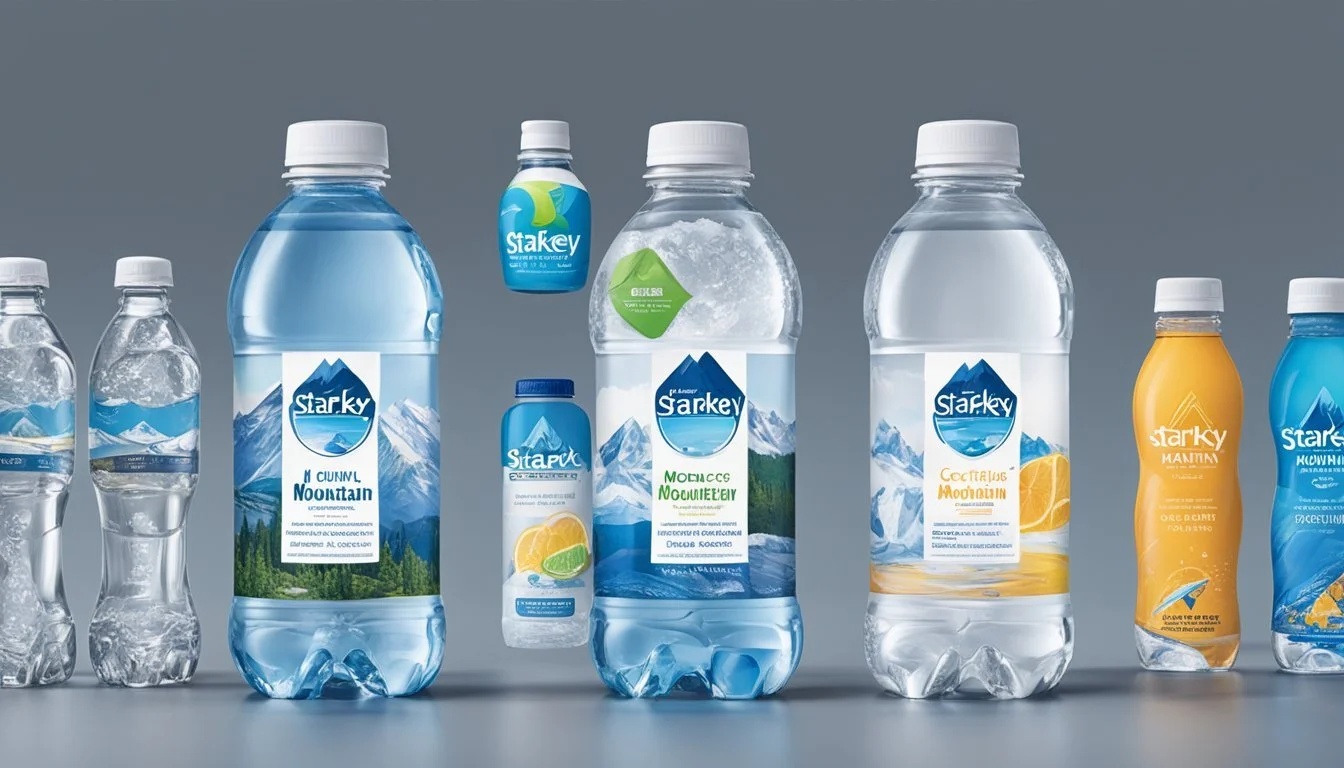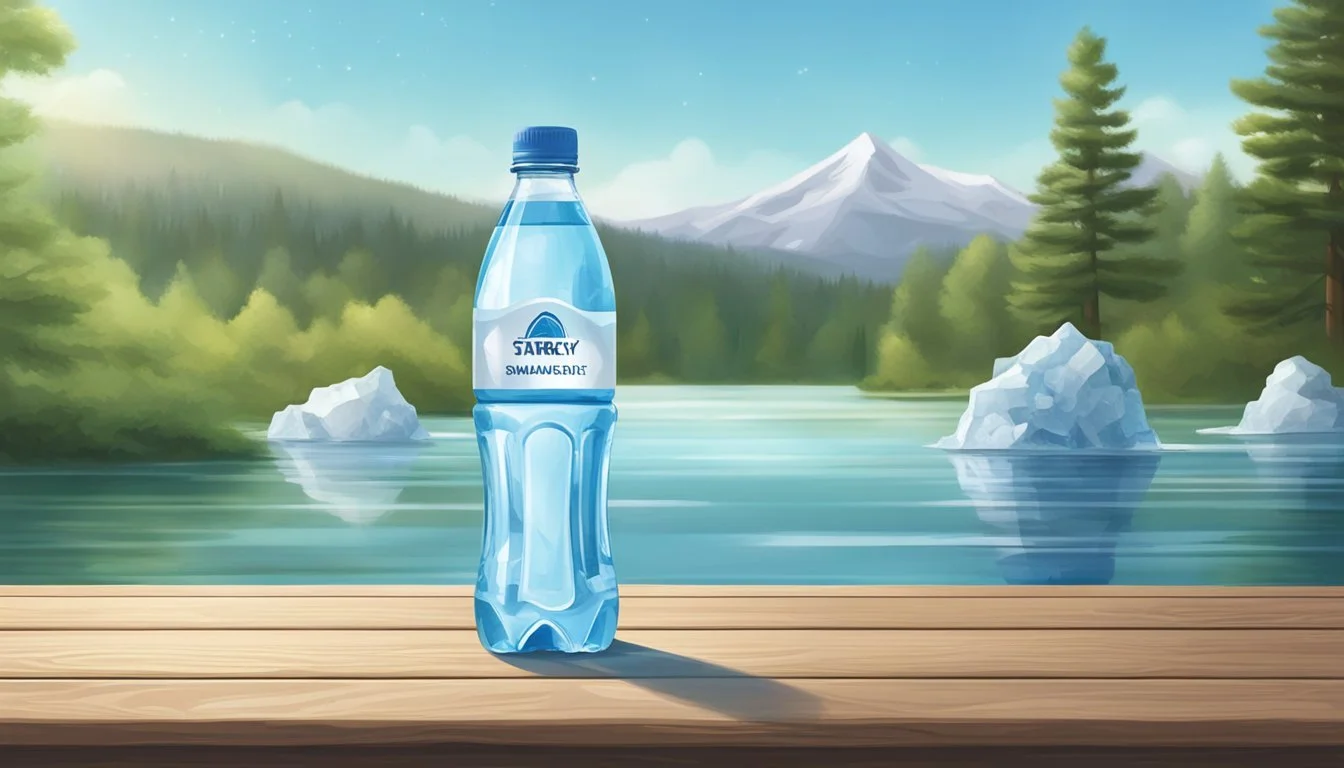Ice Mountain vs. Starkey
Ultimate Bottled Water Showdown
Ice Mountain and Starkey bottled waters are two popular choices for hydration, both boasting unique characteristics that appeal to different tastes and preferences. Ice Mountain is known for its multi-step filtration process, ensuring clean and crisp water that is free of large particles. This method highlights its commitment to purity and quality, making it a favorite among consumers who prioritize clean-tasting water
Starkey, on the other hand, offers a distinct flavor profile that sets it apart. Sourced from geothermal springs, Starkey water carries a mineral-rich composition that can provide a unique drinking experience. This mineral content gives Starkey a subtly different taste, appreciated by those who enjoy natural spring waters with a hint of earthiness.
Ice Mountain often wins on taste and quality due to its rigorous filtration methods and refreshing flavor. While Starkey's mineral content may attract some, Ice Mountain’s consistent purity and taste make it the superior choice for most bottled water enthusiasts.
Comparing Brands: Ice Mountain and Starkey
Ice Mountain and Starkey are two prominent bottled water brands with distinct heritages and market strategies. They differ in their brand heritage and product availability, each catering to diverse consumer preferences.
Brand Heritage and Market Presence
Ice Mountain is sourced from natural springs in the Midwest and has a long-standing reputation, especially in regional markets. The brand is known for its clean taste and accessibility. Owned by BlueTriton Brands, Ice Mountain benefits from extensive distribution networks and marketing campaigns that emphasize its natural origins.
Starkey, on the other hand, is sourced from a geothermal spring in Idaho and owned by Whole Foods Market. It stands out for its unique origins and mineral-rich content. Starkey appeals to consumers seeking premium bottled water, marketed heavily within Whole Foods stores, and conveys a sense of exclusivity and wellness.
Product Range and Availability
Ice Mountain offers a broad range of products, including purified and spring water in various bottle sizes. This variety makes it convenient for different consumption needs. Their water is readily available in numerous retail outlets, making it a practical choice for everyday hydration.
Starkey’s product range focuses mostly on its natural spring water, available in a limited number of bottle sizes. It is primarily sold through Whole Foods Market, which limits availability to those specific outlets. This selective distribution enhances its image as a premium, niche product tailored for health-conscious consumers.
These differences in heritage, market presence, and product offerings shape each brand’s identity and consumer appeal. Ice Mountain's widespread availability contrasts with Starkey's exclusive retail strategy, reflecting diverse approaches in the bottled water market.
Water Source and Quality
Ice Mountain and Starkey offer unique characteristics in their water sources and quality that are essential for consumers to consider. They both employ specific purification methods to ensure safety, but their natural origins strongly influence their taste, mineral content, and overall purity.
Geographical Origin and Natural Sources
Ice Mountain sources its water from natural springs located in the Great Lakes region. These springs are known for their consistent and fresh water output. The natural springs contribute to the water’s mild mineral taste and clean finish.
Starkey, on the other hand, sources its water from springs in the remote regions of Idaho. Starkey's spring water is praised for its natural purity and rich mineral content. The isolation of these springs helps minimize the risk of contamination from industrial and urban activities.
Purity and Contaminant Levels
Both brands place a strong emphasis on maintaining high purity levels. Ice Mountain ensures low levels of contaminants such as heavy metals, PFAS chemicals, and microplastics through rigorous testing. Their water generally has low total dissolved solids (TDS), indicating minimal contaminants.
Starkey also prioritizes purity, frequently testing for harmful substances like arsenic. The natural origin of Starkey’s water means it is less likely to contain synthetic contaminants, although it occasionally shows higher levels of naturally occurring minerals. Both brands comply with strict regulatory standards to ensure consumer safety.
Purification and Filtration Processes
Ice Mountain uses a multi-step filtration process to ensure its water remains clean and safe. This includes initial screening to remove large particles, followed by fine filtration and ultraviolet (UV) light treatment. This comprehensive process helps maintain the water’s quality and taste.
Starkey's purification method is minimal, relying mainly on natural filtration through underground rock formations. This natural process helps preserve the water’s mineral content while ensuring it is free from most contaminants. Starkey does, however, also employ additional filtration steps when necessary to meet quality standards.
Despite their different approaches, both brands aim to provide high-quality bottled water with distinct characteristics influenced by their unique sources and purification methods.
Health and Hydration Factors
When comparing Ice Mountain and Starkey bottled water, understanding the effects of pH levels and mineral content on health and hydration is crucial. Key aspects like electrolytes, calcium, and magnesium play significant roles here.
Assessing the pH and Mineral Content
The pH level of water affects its taste and potential health benefits. Ice Mountain typically has a neutral pH closer to 7, making it suitable for general hydration. Starkey, on the other hand, often has a slightly alkaline pH, around 8-9, which some claim can aid in neutralizing acid in the body.
Mineral content varies between these waters.
Ice Mountain is rich in calcium and magnesium, essential for bone health and muscle function.
Starkey is also mineral-rich but has higher levels of potassium, beneficial for heart health.
Both brands provide essential electrolytes which help maintain fluid balance and energy levels, important for those leading active lifestyles.
Hydration Benefits and Health Claims
Proper hydration is vital for bodily functions like digestion, temperature regulation, and joint lubrication. Ice Mountain and Starkey both offer effective solutions for staying hydrated, thanks to their unique compositions.
Ice Mountain promotes itself as a source of refreshing hydration, ideal for everyday use. Its balanced mineral content supports routine bodily functions without overwhelming the body with any specific nutrient.
Starkey, sourced from geothermal springs, emphasizes its health benefits, such as improved detoxification and reduced acidity. Its higher pH and electrolyte content make it a popular choice among health-conscious individuals seeking a bit more from their bottled water than just hydration.
The benefits these waters provide make them valuable for various health and hydration needs, depending on one's lifestyle and specific health goals.
Taste and Consumer Experience
The comparison between Ice Mountain and Starkey bottled water often centers on their taste and how consumers perceive their drinking experiences. Differences in flavor profile and consumer feedback play key roles in distinguishing these two brands.
Flavor Profile Assessment
Ice Mountain is frequently described as having a crisp and clean taste. This is attributed to its source from natural springs and its multi-step filtration process. The water is generally free from any distinctive aftertastes, making it refreshing, especially when served chilled.
Starkey water, sourced from a geothermal spring, offers a different experience. It tends to have a slightly mineral-rich profile due to its natural sourcing, providing a unique, smooth flavor. Some drinkers may find this appealing, while others may prefer the straightforward taste of Ice Mountain.
Comparing Consumer Feedback
Consumers of Ice Mountain often highlight its affordability and consistent taste. Reviews frequently note its reliability as a daily water choice. The modest price point adds to its appeal, making it a popular option for many households.
Starkey water garners praise for its premium feel and distinctive taste. Fans of Starkey enjoy the mineral richness and often consider it a luxury choice. However, the higher price point can be a deterrent for some, positioning it as a choice for special occasions rather than everyday hydration.
Environmental Impact and Sustainability
Environmental impact and sustainability are essential considerations when comparing Ice Mountain and Starkey bottled water. Each brand has distinct practices and policies related to packaging and recyclability, as well as broader eco-friendly initiatives.
Packaging and Recycling Initiatives
Ice Mountain and Starkey adopt different approaches to packaging. Ice Mountain traditionally uses plastic bottles, which poses significant environmental concerns due to plastic waste and energy consumption throughout its lifecycle.
Ice Mountain's newer bottles are 100% recyclable and made with 100% recycled plastic (rPET). This reduces their environmental footprint significantly. On the packaging front, Ice Mountain invests in designing bottles that minimize plastic use while ensuring durability.
In contrast, Starkey uses variations of packaging, including recyclable plastic and glass bottles. Their glass options tend to be more eco-friendly, as glass is infinitely recyclable and often reused in various forms. By diversifying packaging materials, Starkey aims to offer alternatives that reduce plastic dependency and promote better recycling habits among consumers.
Eco-Friendly Practices and Company Policies
Ice Mountain has established several eco-friendly practices, including campaigns promoting recycling and community support. Their "Made For A Better Tomorrow" campaign focuses on driving higher recycling rates and assisting communities with water needs. Additionally, Ice Mountain is committed to reducing its environmental footprint through improved logistics and energy-efficient practices.
Starkey, a brand under Whole Foods Market, aligns with Whole Foods' broader sustainability initiatives. They emphasize the importance of sourcing water sustainably and minimizing environmental disturbance during extraction. Starkey also supports local conservation projects and advocates for reducing overall water consumption.
Both brands engage with environmental protection agencies to ensure compliance with sustainability standards, reflecting a commitment to reducing the negative environmental impacts associated with bottled water production and consumption.
Certifications and Regulatory Compliance
Bottled water brands like Ice Mountain and Starkey adhere to several standards and regulations to ensure their products meet quality and safety requirements. These regulations are set by organizations such as the International Bottled Water Association (IBWA) and the Food and Drug Administration (FDA).
International Bottled Water Association Standards
The International Bottled Water Association (IBWA) sets stringent standards for the bottled water industry. These standards cover various aspects such as water source protection, production processes, and product quality.
Members of the IBWA undergo annual, unannounced plant inspections by independent, third-party organizations. These inspections are more rigorous than those required by the FDA or state regulations. Complying with these standards ensures that brands like Ice Mountain and Starkey maintain a high level of safety and quality in their products.
IBWA standards also require member companies to adhere to Good Manufacturing Practices (GMPs), ensuring the reliability and integrity of bottled water throughout the production and packaging processes.
Food and Drug Administration Regulations
The Food and Drug Administration (FDA) regulates bottled water as a packaged food product. The FDA’s regulations ensure that bottled water meets the same safety standards as municipal tap water.
The FDA requires bottled water manufacturers to follow Standards of Identity, which define different types of bottled water such as spring water and purified water. Compliance with these standards helps consumers understand what they are purchasing.
Additionally, the FDA enforces Standards of Quality that limit the levels of contaminants in bottled water. These regulations cover potential contaminants such as lead and other harmful substances, ensuring the water is safe for consumption. Regular monitoring and testing are mandatory to meet these standards, providing an extra layer of safety for consumers.
Price and Affordability
Consumers often weigh the price and affordability of bottled water brands when making their purchasing decisions. Comparing the costs of Ice Mountain and Starkey spring water may help determine which provides better value for money.
Cost Comparison and Value for Money
Ice Mountain is generally known for its affordability, particularly in the Midwest states. A 24-pack of 16.9oz bottles typically costs between $3.50 and $5.00. Its status as a natural spring water positioned at a lower price point makes it appealing for price-sensitive consumers.
Starkey Spring Water, often marketed as a premium brand, typically comes at a higher price. A 12-pack of 12oz bottles can range from $15 to $20. The higher cost reflects its branding and packaging, which some consumers perceive as better quality compared to municipal or tap water.
While Ice Mountain offers value through affordability, Starkey taps into a market willing to pay for perceived superior quality. The choice between these two brands depends on the consumer's preference for either budget-friendly options or premium, higher-cost water.
Choosing the Right Bottled Water
Selecting the best bottled water involves understanding personal preferences and knowing what indicators signify quality. This section will provide insights into what to consider when selecting bottled water.
Understanding Your Needs and Preferences
Consumers have different needs and preferences when it comes to bottled water. Some prefer spring water for its natural source and taste, while others may opt for distilled water for its purity.
Those who value the taste of water should consider the mineral content, as minerals like calcium and magnesium can enhance flavor. On the other hand, individuals concerned about contaminants might prioritize filtered water with rigorous purification processes.
Packaging can also influence choices. Environmentally conscious consumers may prefer brands using recycled materials or biodegradable packaging.
Tips for Selecting Quality Water
Quality water can often be determined by examining the source and the filtration process. Reputable brands like Ice Mountain undergo multi-step filtration to remove impurities. Checking for certifications from organizations such as NSF International can also indicate high standards.
Another crucial factor is the label information. Consumers should look for details about the water source and whether it contains any additives like sodium or sweeteners, which might be undesirable for some.
Lastly, staying informed through reviews and consumer reports can offer practical insights into the reliability and quality of various bottled water brands. Regularly updated rankings can guide better choices.
The Bottom Line
When comparing Ice Mountain and Starkey, several factors come into play.
Taste: Ice Mountain offers a clean and refreshing flavor, while Starkey has a unique mineral taste.
Source: Ice Mountain is sourced from springs in Michigan. Starkey originates from a geothermal spring in Idaho.
Mineral Content: Starkey contains notable minerals like calcium and magnesium. Ice Mountain possesses a lower mineral content.
Price: Ice Mountain is generally more affordable. Starkey, as a premium brand, tends to be pricier.
Availability: Ice Mountain is widely available in supermarkets. Starkey might be harder to find, often seen in specialty stores.
Consumer Preferences: Some prefer Ice Mountain for its accessibility. Others appreciate Starkey's distinct mineral composition.
Key Points:
Ice Mountain: Clean taste, affordable, widely available.
Starkey: Unique mineral taste, premium price, specialty availability.
More About Ice Mountain
Core Hydration vs Ice Mountain: Which Bottled Water is Better?
Ice Mountain vs Aqua Carpatica: Which Bottled Water is Better?
Ice Mountain vs Cascade Mountain: Which Bottled Water is Better?
Ice Mountain vs Crystal Geyser: Which Bottled Water is Better?
Ice Mountain vs Crystal Lake: Which Bottled Water is Better?
Ice Mountain vs Essence pH10: Which Bottled Water is Better?
Ice Mountain vs Hawaii Volcanic: Which Bottled Water is Better?
Ice Mountain vs Hawaiian Springs: Which Bottled Water is Better?
Ice Mountain vs Icelandic Glacial: Which Bottled Water is Better?
Ice Mountain vs Kirkland Signature: Which Bottled Water is Better?
Ice Mountain vs Liquid Death: Which Bottled Water is Better?
Ice Mountain vs Mountain Valley Spring Water: Which Bottled Water is Better?
Ice Mountain vs Nestle Pure Life: Which Bottled Water is Better?
Ice Mountain vs Poland Spring: Which Bottled Water is Better?
Ice Mountain vs Proud Source: Which Bottled Water is Better?
Ice Mountain vs Purely Sedona: Which Bottled Water is Better?
Ice Mountain vs Richard's Rainwater: Which Bottled Water is Better?
Ice Mountain vs San Pellegrino: Which Bottled Water is Better?
Ice Mountain vs Simple Truth: Which Bottled Water is Better?
Ice Mountain vs Solan de Cabras: Which Bottled Water is Better?
Ice Mountain vs Talking Rain AQA: Which Bottled Water is Better?
Ice Mountain vs Whole Foods 365: Which Bottled Water is Better?
Ice Mountain vs Whole Foods Italian Still Mineral water: Which Bottled Water is Better?
More About Starkey
Icelandic Glacial vs Starkey: Which Bottled Water is Better?
Mountain Valley Spring Water vs Starkey: Which Bottled Water is Better?
Starkey vs Kirkland Signature: Which Bottled Water is Better?
Starkey vs Richard's Rainwater: Which Bottled Water is Better?
Starkey vs Whole Foods Italian Still Mineral water: Which Bottled Water is Better?

